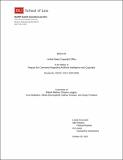Comment to U.S Copyright Office on Data Provenance and Copyright
Author(s)
Mahari, Robert; Shayne, Longpre; Donewald, Lisette; Polozov, Alan; Pentland, Alex 'Sandy'; Lipsitz, Ari; ... Show more Show less
DownloadCOLC-2023-0006-9063_attachment_1 (2).pdf (346.1Kb)
Terms of use
Metadata
Show full item recordAbstract
Scholars have paid much attention to the copying of raw data to train and develop machine learning models. Many have argued that such use of raw data, derived either directly from the internet or from a dataset, is protected under fair use such that the owners of the original work may not be successful in a claim for copyright infringement. We refer to such compilations of data derived from another source, and repurposed for machine learning, as unsupervised datasets. Less attention, however, has been paid to supervised datasets, which we define as datasets containing data created for the sole purpose of training machine learning models (mainly for finetuning and alignment). Supervised datasets may likely contain copyrightable contributions from the dataset creators in the form of annotations. To the extent that dataset creators likely have copyright interests in their supervised datasets, model developers must either rely on fair use or a license in order to avoid infringing the work of dataset creators. However, we argue that the unauthorized use of supervised datasets is unlikely to be protected by fair use. Whereas the use of unsupervised data for training machine learning is distinct from the original purpose of the unsupervised data, the unauthorized use of supervised datasets for training machine learning is identical to its original purpose. Fair use would therefore likely not apply to the annotations, labels, and curated comments in supervised datasets. For this reason, having a valid license to a supervised dataset is perhaps particularly critical. Unfortunately, our recent research has found that the licenses attached to publicly available supervised datasets are often imprecise, inaccurate, or missing altogether. Model developers may be exposing themselves to unknown amounts of liability. We argue that this is a problem that needs to be addressed and propose a tool that might serve as a launching point for ensuring license transparency.
Date issued
2023-11-01Department
MIT Connection Science (Research institute)Publisher
U.S. Copyright Office
Keywords
Computational Law, Data Provenance, Fair Use, Copyright Law, Large Language Models, Generative AI, AI Regulation, Regulation by Design
Collections
The following license files are associated with this item: